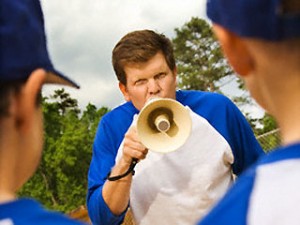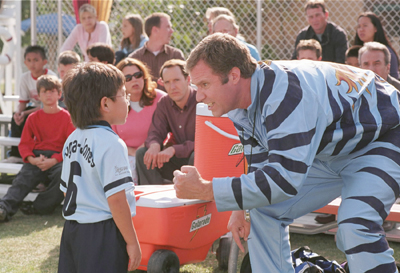
Our goal today is to provide parents with a little incite into what experiences some of our trainers (Ben and Kevyn to be exact) had when they played sports and what kind of relationship they had with their parents.
When discussing the concept of parent involvement in youth sports we all have that initial harrowing thought of some parent yelling at a kid, maybe not even their own, because they screwed up in some way. A similar example could be that parent that waits for the coach after every practice to talk playing time and role on the team, but those parents never thought they would become that parent. Everyone always has the “best” intentions when it comes to their kids but sometimes we fall short and lose focus on what’s really important to our son or daughter.
Ben: I recall a basketball game when I was just off the whole game, none of my shots were falling, I wasn’t playing very good defense, and mentally I was not engaged. After the game all I wanted to talk about was how bad I did and how the team lost but my dad quickly interjected and reminded me that it truly is just a game, but not really in those words. Now, my father is a humble, hardworking dairy farmer with a big Grizzly Adams’ like beard that attended every single one of my games…EVERY ONE!!! Which is a pretty unimaginable feat if you know farmers. Well, after listening to me gripe for a short time my dad excused himself from the table told me that even though I had a bad game he knew I would rebound (pun intended) and play better next time. He also reminded me that my Aunt was gone tomorrow and I was on milking duty with him the next morning at 5:30am. I knew that I had to get up but didn’t understand why he was reminding me in the first place. Days later, I realized that is was just my father’s way of reminding me that they all support me and my athletic accomplishments, but that there are much bigger things in life than having a bad game and allowing everyone to sulk or get angry about it. I always felt supported in everything I did but it took some time to realize that I didn’t need nor want a father that yelled when I did something wrong or always had to “TALK” with the coach.
Kevyn: I always have had a great relationship with my dad. People always ask where my dad played baseball and how good he was in high school. Truth is, my dad was a wrestler, he sat the bench on the football team and I’m not even sure if he even made the varsity baseball team (Sorry dad). Now a lot of people ask how could a guy like that produced 2 professional athletes and another collegiate athlete (one brother played baseball for the Twins, Reds, and Mariners and another pitched at UW-Lacrosse). It’s because no matter what the circumstance was, he was always on my side. He shared disappointment with me when I lost but pointed out the good. He shared joy with me but always kept me grounded. Here is what I know about my dad: When I wanted to play catch, he never said no, and I mean NEVER. When we watched the Packers on Sunday’s we watched the 1st half, then went outside and never came back inside because we were playing football for the rest of the afternoon. What my dad said to me, I thought was gospel. This isn’t because he was a world class athlete, or played college sports, it was because he cared. Rides home from sporting events when I was younger focused on getting better but weren’t over-bearing. Dad would always be on my side no matter what the circumstance or level I was playing . Let’s turn it up a notch: playing professional baseball, I had more than my share of bad games. My dad would always call about twice a week. Now you probably assumed all I would want to talk about was baseball on the nights that I went 0-4 with an error in the field, but dad would call and the first thing out of his mouth was “you won’t believe how big the buck was that I saw on the road today” or “man it really rained hard here today”. He knew baseball was the last thing I truly wanted to talk about, so he didn’t even try to ask. It wasn’t easy for him because he felt the same pain that I was feeling but he knew that talking about it would just make it worse. So he kept it light and made sure I was staying level headed. I didn’t need him to tell me that I was hitting .235 in Single A, I already knew that. He also didn’t have to tell me that he was there for me and he was just so proud that I was his son, I already knew that.
In conclusion, think about one of the most talked about phrases we can say to our athletes after a sporting event:
“I love to watch you play” is a powerful comment that we can make as parents to our athletes. Take it from those that work with your athletes on a regular basis, they don’t need more criticism, they need more support!
Ben: I recall a basketball game when I was just off the whole game, none of my shots were falling, I wasn’t playing very good defense, and mentally I was not engaged. After the game all I wanted to talk about was how bad I did and how the team lost but my dad quickly interjected and reminded me that it truly is just a game, but not really in those words. Now, my father is a humble, hardworking dairy farmer with a big Grizzly Adams’ like beard that attended every single one of my games…EVERY ONE!!! Which is a pretty unimaginable feat if you know farmers. Well, after listening to me gripe for a short time my dad excused himself from the table told me that even though I had a bad game he knew I would rebound (pun intended) and play better next time. He also reminded me that my Aunt was gone tomorrow and I was on milking duty with him the next morning at 5:30am. I knew that I had to get up but didn’t understand why he was reminding me in the first place. Days later, I realized that is was just my father’s way of reminding me that they all support me and my athletic accomplishments, but that there are much bigger things in life than having a bad game and allowing everyone to sulk or get angry about it. I always felt supported in everything I did but it took some time to realize that I didn’t need nor want a father that yelled when I did something wrong or always had to “TALK” with the coach.
Kevyn: I always have had a great relationship with my dad. People always ask where my dad played baseball and how good he was in high school. Truth is, my dad was a wrestler, he sat the bench on the football team and I’m not even sure if he even made the varsity baseball team (Sorry dad). Now a lot of people ask how could a guy like that produced 2 professional athletes and another collegiate athlete (one brother played baseball for the Twins, Reds, and Mariners and another pitched at UW-Lacrosse). It’s because no matter what the circumstance was, he was always on my side. He shared disappointment with me when I lost but pointed out the good. He shared joy with me but always kept me grounded. Here is what I know about my dad: When I wanted to play catch, he never said no, and I mean NEVER. When we watched the Packers on Sunday’s we watched the 1st half, then went outside and never came back inside because we were playing football for the rest of the afternoon. What my dad said to me, I thought was gospel. This isn’t because he was a world class athlete, or played college sports, it was because he cared. Rides home from sporting events when I was younger focused on getting better but weren’t over-bearing. Dad would always be on my side no matter what the circumstance or level I was playing . Let’s turn it up a notch: playing professional baseball, I had more than my share of bad games. My dad would always call about twice a week. Now you probably assumed all I would want to talk about was baseball on the nights that I went 0-4 with an error in the field, but dad would call and the first thing out of his mouth was “you won’t believe how big the buck was that I saw on the road today” or “man it really rained hard here today”. He knew baseball was the last thing I truly wanted to talk about, so he didn’t even try to ask. It wasn’t easy for him because he felt the same pain that I was feeling but he knew that talking about it would just make it worse. So he kept it light and made sure I was staying level headed. I didn’t need him to tell me that I was hitting .235 in Single A, I already knew that. He also didn’t have to tell me that he was there for me and he was just so proud that I was his son, I already knew that.
In conclusion, think about one of the most talked about phrases we can say to our athletes after a sporting event:
“I love to watch you play” is a powerful comment that we can make as parents to our athletes. Take it from those that work with your athletes on a regular basis, they don’t need more criticism, they need more support!


